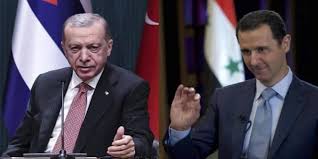Turkey is positioning itself to capitalize on the evolving situation in Syria, following the collapse of the Baathist regime and significant regional shifts, Bloomberg reports. However, a critical question remains: can Turkish President Recep Tayyip Erdoğan secure support from U.S. President Donald Trump for his plans?
Turkey’s Reconstruction Ambitions
Turkey has quietly gained the endorsement of both the United States and Israel to play a pivotal role in Syria’s reconstruction—albeit under two conditions: avoiding military action against Kurdish forces in Syria and softening its rhetoric against Israel’s policies in Gaza and the West Bank, according to Bloomberg’s sources.
Hundreds of Turkish trucks carrying food, medicine, and construction materials have already begun daily deliveries to Syria’s border regions. Erdoğan aims to spearhead reconstruction efforts, an undertaking that could bring billions of dollars to Ankara while expanding its geopolitical influence.
Bloomberg’s sources close to Ankara confirm that Turkish officials are actively engaging with their Syrian counterparts to coordinate these efforts, with destroyed cities, hospitals, schools, and infrastructure set to be rebuilt.
The anticipated economic boon has already impacted Turkish markets. Shares in Turkish cement and steel companies surged, and Turkish Airlines resumed flights to Damascus after a 13-year hiatus.
Conditions from the U.S. and Israel
While Turkey’s aspirations have received quiet nods of approval, Bloomberg reports that this support comes with strings attached. U.S. and Israeli officials have reportedly stipulated that Turkey must refrain from targeting Kurdish forces such as the U.S.-backed YPG and SDF and temper its criticism of Israeli policies in Palestinian territories.
However, Ankara has pushed back, calling for the disbandment of the YPG and SDF, which it views as affiliates of the PKK, a designated terrorist organization. Turkish officials have also emphasized the need for PKK fighters to leave the region and have hinted at the possibility of PKK leader Abdullah Öcalan urging the group to lay down arms.
Shifting Sentiments in Washington
The United States has long regarded the YPG and SDF as vital allies in its fight against Daesh, but Bloomberg notes a potential shift in Washington’s stance. Trump has described Erdoğan as a “friend” and emphasized Turkey’s potential role as a key player in shaping Syria’s future. Erdoğan, in turn, hopes to persuade Trump that NATO’s second-largest army is better positioned to prevent Daesh’s resurgence and ensure stability.
One of Turkey’s objectives is to loosen Kurdish forces’ control over Syria’s oil fields, a critical revenue source for the nation’s reconstruction efforts.
A Balancing Act for Ankara
As Turkey navigates its ambitions in Syria, Erdoğan faces a delicate balancing act between securing U.S. and Israeli approval and pursuing Ankara’s regional interests. While the mood in Washington may be shifting, longstanding tensions over Kurdish forces and broader geopolitical dynamics remain potential hurdles to Erdoğan’s vision of Turkey as a leading force in Syria’s future.
Source: cumhuriyet.com.tr
Translation: Cem Cetinguc
